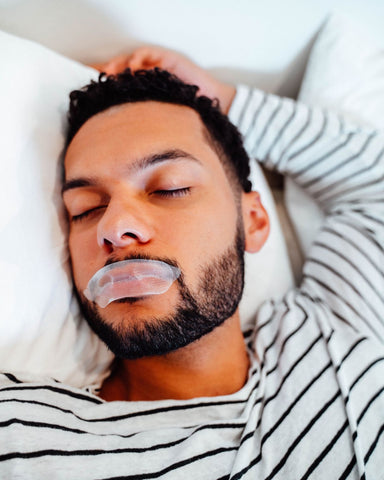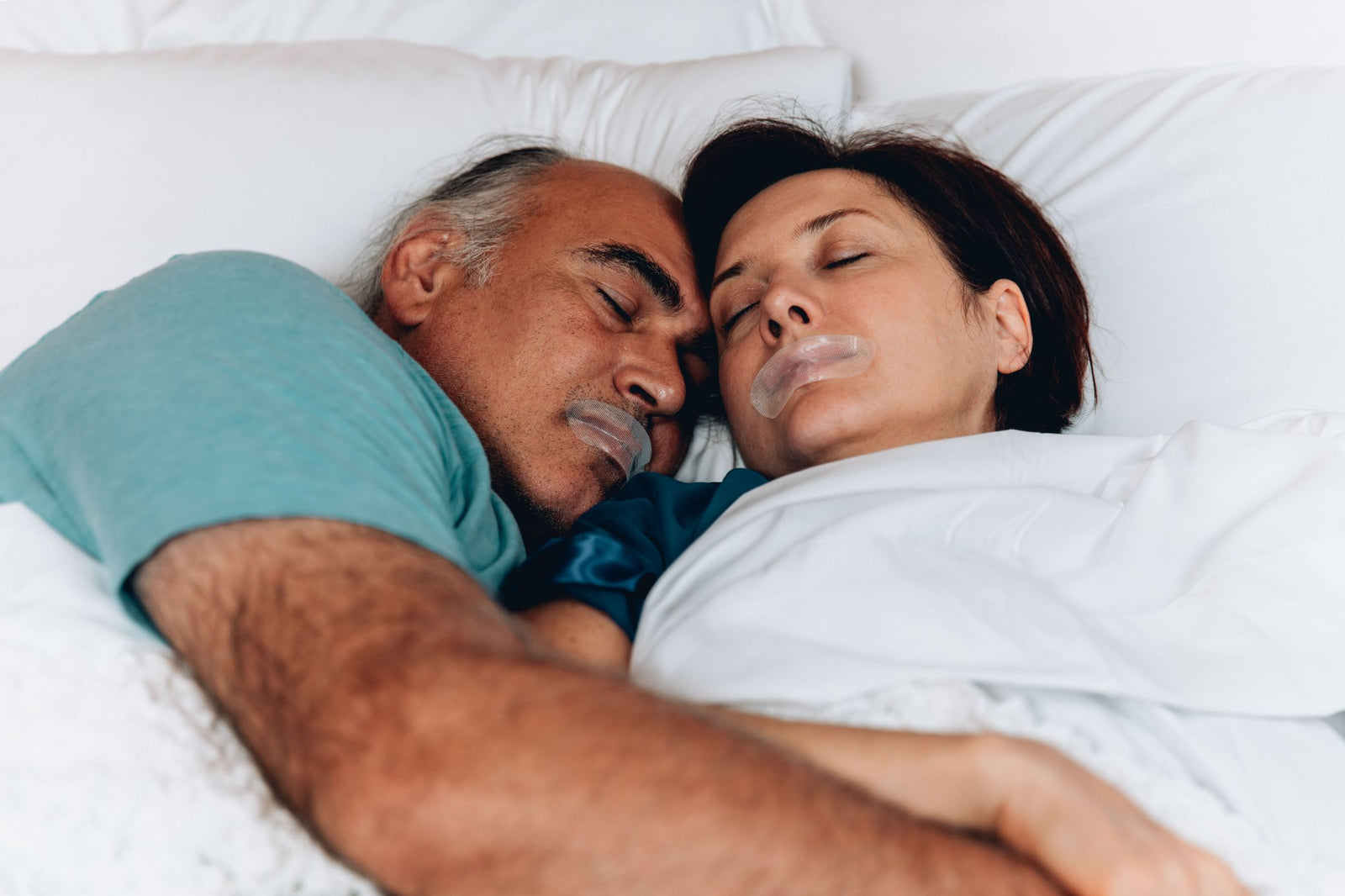Do you often wake up with a dry mouth or experience issues with snoring? Do you embarrassingly “snore yourself awake” on a regular basis?
You may have just accepted these issues as your reality. The truth is, snoring is more than just a nuisance; it’s a danger to your health and your quality of life.
Fortunately, snoring doesn’t have to be a lifelong problem. Curing your snoring may be as simple as using a device to keep your mouth closed while sleeping.
Before we share the best five devices to help you achieve this goal, let’s first discuss why snoring is such a huge concern in the first place.
Why Should I Be Concerned About Snoring?
The majority of the population snores. In fact, it’s estimated that 40 percent of women, 57 percent of men, and 27 percent of children suffer from snoring.
Snoring occurs as the airway muscles relax and fall backward, creating a blockage. As the tissues vibrate together, they produce the notorious sound we all know and hate.

The sound and vibration are typically a result of open-mouth breathing during the night. Luckily, snoring is preventable with the use of a nose breathing device.
Since a large number of people snore, you’ve probably assumed that snoring is a laughable, unavoidable thing that happens as we sleep, right? Wrong. The very real effects of chronic snoring are nothing to brush off.
Snoring raises the risk for serious health conditions, such as:
- Diabetes
- Obesity
- Hypertension
- Heart attack/various cardiovascular problems
- Stroke
If you experience multiple pauses in breathing as you sleep, gasping, or choking, you should get an evaluation by a sleep specialist to find out if you have obstructive sleep apnea.
The Connection Between Snoring and Sleep Apnea
Sleep apnea causes multiple pauses in breathing throughout the night, known as apneas. Pauses in breathing increase blood-oxygen levels, awakening the brain and causing gasps or snorts.
If left untreated, sleep apnea can lead to death in serious cases, so it’s important to get a sleep study done to uncover the reason for your snoring and sleep quality issues.
Your doctor or sleep specialist may prescribe a Continuous Positive Airway Pressure (CPAP) machine that can help treat your obstructive sleep apnea if you’re found to have it.

However, your mouth may still fall open during the night, rendering the CPAP therapy less effective.
Sleep apnea or not, nasal breathing at night rather than mouth breathing can help alleviate airway issues, health risks, and snoring. That’s why a nose breathing device that helps to keep your mouth closed while sleeping is essential.
There are many types of these devices on the market and sorting through all of the options can be tricky to navigate.
We’ve gathered the best five options to help you make a painless, educated choice. Some devices are one-and-done purchases, while other disposable treatments require continuous purchasing.
One popular treatment option is a Mandibular Advancement Device (MAD), which works by holding the jaw in a forward position.
1. Mandibular Advancement Devices (MADs)
MAD’s, named after the technical name for the jaw bone (mandible), work by moving the lower jaw forward. This is thought to keep the airway separated and open, leading to less turbulence and vibration.
However, some users report discomfort and shifting of the teeth, so this option is not for everyone.
A popular MAD from SnoreRx features custom molding trays to fit any mouth shape. The device is also adjustable, which may help prevent teeth shifting.
Tongue Stabilizing Devices, or TSDs, work by isolating the tongue rather than repositioning the jaw.
2. Tongue Stabilizing Devices (TSDs)
TSDs work by pulling the tongue toward the front of the mouth, leading to more room in the back of the throat. This prevents airway collapse by creating a larger gap that helps to reduce or eliminate vibration.
TSDs are known for being easier on the teeth, meaning they don’t typically lead to TMJ or teeth shifting. This makes a TSD an appealing option for those with pre-existing dental issues.
However, some TSD users claim that the position the device forces their tongue to stay in is uncomfortable. TSDs may also cause an increase in saliva production.
If you’re seeking a less invasive device, something as simple as a wedge pillow may get the job done.
3. Wedge/Positional Pillows
It’s highly unlikely that you think of pillows as a potential device to keep your mouth closed while sleeping, but the right pillow can do exactly that.
If you sleep on your back, a wedge pillow helps to elevate the upper part of your body and head, much like an adjustable bed.
There are also several pillows out there designed to keep you from rolling onto your back in the first place, such as the Zzoma Positional Device.
If special pillows aren’t for you, a nasal dilator may be the answer.
4. Nasal Dilators
One of the easiest ways to keep your mouth closed while sleeping? Prevent your nose from becoming blocked.
Nasal dilators are named after the technology they utilize: they work to dilate the nasal passages, keeping them clear from congestion.
There are two main types of nasal dilators: external dilators and internal dilators.
External dilators are the more popular and widely used form. They’re typically made of a rigid material that adheres to the external skin on your nose.

Once applied, this rigid plastic springs back, keeping the nasal passages open and allowing air to flow in and out freely.
Internal nasal dilators, on the other hand, work from inside the nostrils, keeping the cartilage open and improving airflow from within the nose.

When debating which nose breathing device is best, consider whether or not you suffer from a deviated septum. Internal dilators may be helpful for snorers with deviated septums, but external nasal dilators may not always be able to prevent collapse caused by deviation.
Nevertheless, mouth breathing is still somewhat possible with nasal dilators (and nearly every other device on this list).
So what is the ultimate device to keep your mouth closed while sleeping? Mouth tape.
5. Mouth Tape
As we’ve covered, nasal breathing is best for achieving and maintaining quality health. Mouth tape is a gentle, no-nonsense way to achieve it without any added stress.
We know it sounds silly, but taping your mouth at night encourages nasal breathing by making it physically challenging for the mouth to fall open as you sleep.
@somnifix #NoseBreathing = better quality of life ☺️ #breathwork #wellnesstips #stressmanagement #sleepquality #didyouknow #learnontiktok via @Danielle Bertolotti
♬ You're a Jerk - New Boyz
Mouth tape also promotes a proper tongue posture by allowing the tongue to rest against the roof of the mouth.
Better yet, you can even wear mouth tape during a workout or run to boost nitric oxide production and performance.
Furthermore, it can help you put a stop to waking up with a dry mouth or bad breath.

For sleep apnea sufferers, mouth tape can help you wear a more comfortable type of CPAP mask by keeping your lips sealed -- and it may even help you ditch your chin strap for good.
When you’re ready to select a tape, where do you start? Will any tape already in your house suffice?
SomniFix: A Hypoallergenic and Comfortable Anti-Snoring Device
If you’re ready to commit to a device to keep your mouth closed while sleeping, look no further than SomniFix Mouth Strips.
Certain tape can irritate the skin, causing rashes or allergic reactions due to chemicals in the adhesive.
Those with even the most sensitive skin can benefit from all that mouth tape has to offer with our mouth tape strips.

Our strips are hypoallergenic, latex-free, gluten-free, and so comfortable that you’ll forget you have them on night after night.
You can even combine them with some other anti-snoring aids, like a nasal dilator or special pillow for maximum snoring defense.
On your search for the winning nose breathing device, SomniFix takes the gold.



